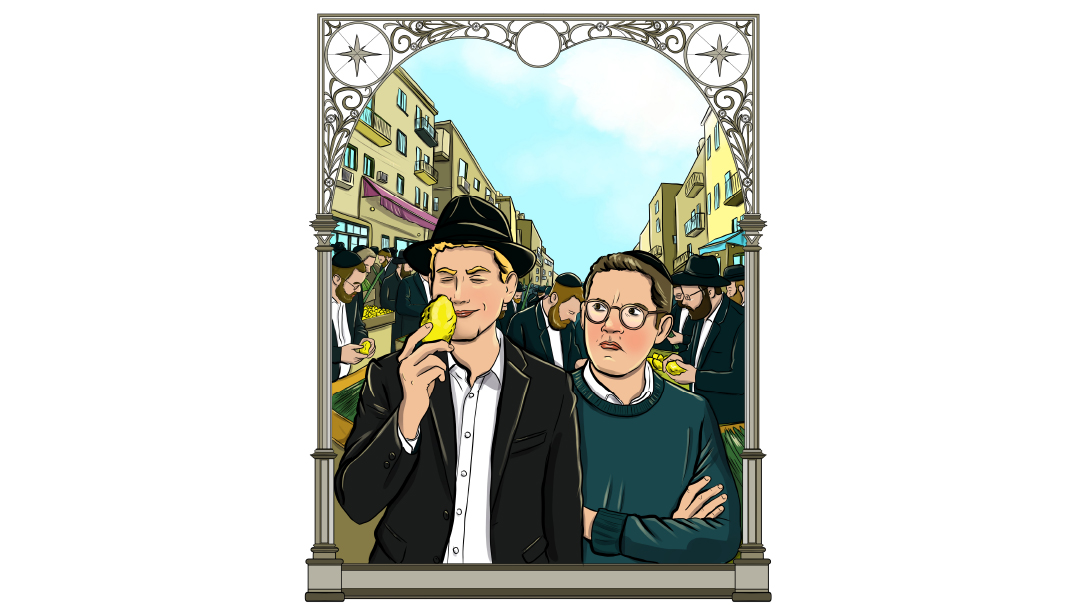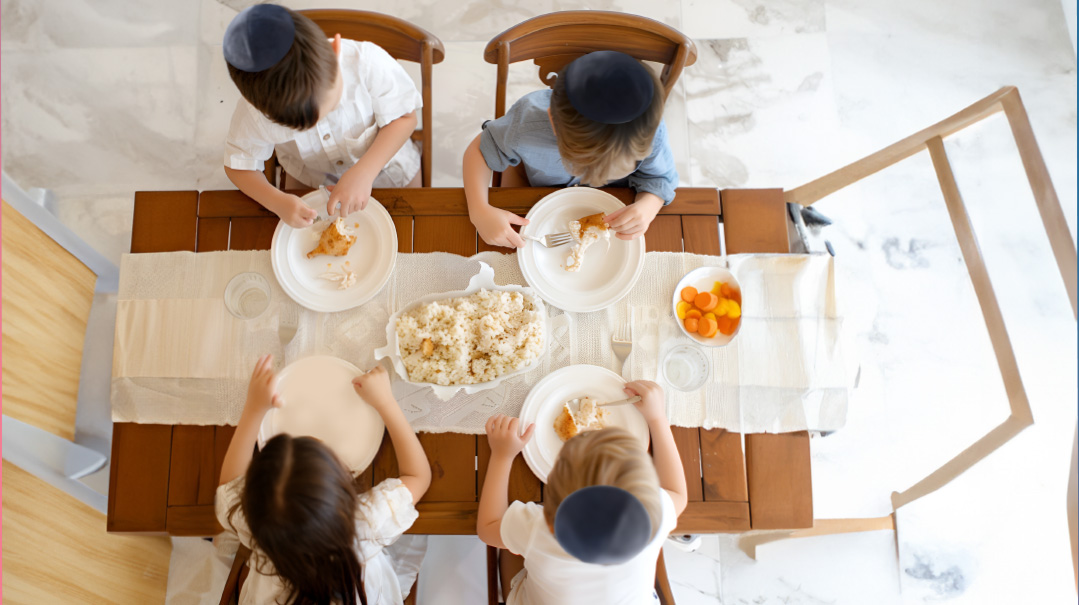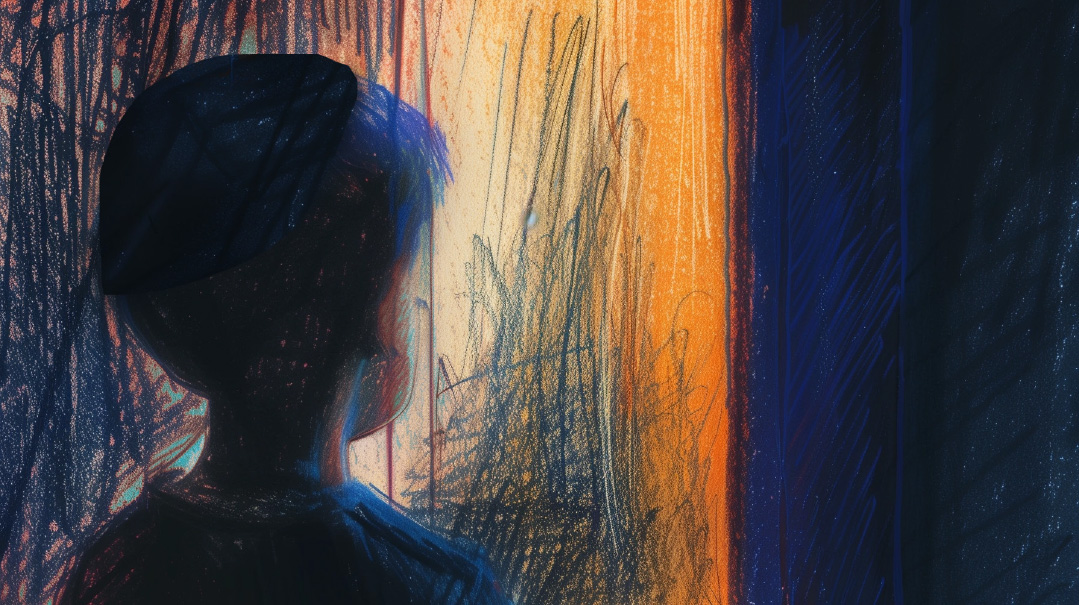Pause for Effect

She concludes again, realizing dimly that she’s repeated the exact answer she gave — Shana? Yehudis? — last year, almost word for word. But so what?

Photo: Shutterstock
Three words are written in the margin of her notes: Pause for effect!
She skims the words, eyes only leaving the intent faces of her students for a fraction of a second.
She gives a tiny, uncalled-for grimace, then quickly rearranges her features into a wide smile. “Remember, girls. In the end, those without bitachon will receive the same results anyway…but work so much harder!”
Pause for effect, indeed. As if, when saying this over for the 28th year running, she needs the reminder. If she were giving this shiur in her dreams, she would imbue that last phrase with an introductory two-second silence.
She shuffles her papers. “And that, girls, brings us to the end of—”
A hand waves frantically in the air. She surreptitiously checks the seating plan. Gittel Braineman.
“Yes, Gittel?”
The girl lowers her hand with an audible sigh of relief. “Rebbetzin Schwartz, I don’t understand how we would know where the right balance is, between bitachon and hishtadlus.”
Oh, so Gittel is the Chumi Homburger of the year. Funny how she can remember her first-year talmidos so distinctly, down to their idiosyncrasies and the questions they asked on her fifth Hashkafah class. Especially when this is the — a sneak peek downward again — the 19th time this question has been raised at the end of this particular lesson.
“Gittel, what a wonderful question!” she enthuses. “Girls...” She turns significantly in the direction of the few in the far left side of the classroom who are shifting in their seats, eager to escape the classroom after a full morning of studies. “I want everyone to think, and think carefully… how would you answer this question? When would you know what that fine, fine line is between doing too little — because remember, we said that Hashem runs the world in such a way that we need to do our hishtadlus to receive results — and doing too much, which, as we said, is pointless…?”
Hesitant hands, a few half-baked suggestions.
“Let me answer with a practical example…” Her eyes roam the room as she speaks, noting that at least 80 percent of the students before her are all wide eyes and furrowed brows, many frantically scribbling the words as she says them.
She concludes again, realizing dimly that she’s repeated the exact answer she gave — Shana? Yehudis? — last year, almost word for word. But so what? Gittel is smiling and nodding very fast, and the class seems satisfied.
She pauses. Then, “Girls, you’re dismissed. Any further questions on the class, you’re welcome to come ask.”
The girls rise and stretch. A small wave surges forward, surrounding her desk.
“Rebbetzin Schwartz, the mashal of the hunter didn’t seem to fit with…”
“What the Rebbetzin said about Yosef and the butler…”
“Yochi’s question, I didn’t get it down clearly, but…”
She’s suddenly tempted to silence them all and read out her list of questions asked previously on this class, complete with the notes on how she’d answered them. A grand total of five minutes, and all their infinite difficulties with the lesson would be clarified. After 28 years, she’s reasonably sure no one will be coming up with anything new.
But their eyes are bright and eager, and their voices so very sincere as they search to understand with the intensity only seminary girls possess. And so she silences the strange, cynical voice inside her that just wants a coffee and a rest, and switches on her brightest, most welcoming smile.
“One at a time, please. I can’t possibly answer all your wonderful questions all at once. Let’s start here, with—” She breaks off, realizing that somehow she’s forgotten the name of the lively blonde who holds a five-out-of-five track record for staying late after class, each time with at least four questions.
“Elky,” the girl supplies quickly, flashing a smile. “So, I didn’t fully understand the last thing the Rebbetzin said…”
When she leaves the building half an hour later, she walks home very, very fast.
In hindsight, she realizes, she should have seen it coming.
“A few minutes? You mean, outside the classroom?” The last few stragglers trickle out into the corridor, and even the earnest group of questioners have left for lunch. !
“Uh, yes. If the Rebbetzin isn’t too busy…” Elky is becoming flustered, and she hastens to smooth over the awkwardness.
“Not at all, not at all.” In her eagerness to reassure the girl, she finds herself almost babbling. It takes a conscious effort to slow down, put that touch of meaningful emphasis into the words. “I understand this isn’t something you want to discuss in a public place.”
Elky relaxes, so she knows the lines were right. With a nod, she leads the way to a side room, venue of many a lengthy, serious heart-to-heart over the years. The room has a slightly musty smell. She hasn’t been here in a while.
Memory. A shadow of good feeling flits through her. She used to enjoy this, she realizes, bitterness seeping through her like a slow-spreading puddle of grimy water. Used to spend hours overtime here, sharing and talking and encouraging. Making a difference. Or at least, thinking she was.z
She shakes away the thought and focuses on Elky.
The blonde curls seem more subdued than usual. This must be a real Deep-Seated Issue. She leans forward slightly in her seat, creases her brows.
“So. I’m all ears.”
Elky plays with the charm of her bracelet. “Uh, it’s like this. I’ve been thinking about a lot of the lessons we’ve been having, and I’m starting to get a little nervous.” She blushes and coughs, making brief eye contact. “I mean, it’s not like I’m getting married tomorrow, but I keep thinking, like what will I do to really make my home a mikdash me’at? Where the Shechinah can rest, like Rebbetzin Schwartz said? I mean, I know I can encourage my husband and children to learn, but from me. I mean, doesn’t the woman set the tone of the home? Like the Rebbetzin said last week?”
A grand total of three “I means” in one speech. She is tempted to hold up a hand, tell Elky she knows exactly what she means. Of course she does. She’s heard it all before.
“You know, Elky, just being positive toward Yiddishkeit and keeping a calm, peaceful home is making your house into a mikdash me’at, and allowing the Shechinah to rest there.” She chuckles. “And that’s not as easy as it sounds, either!”
“I know, but I’m wondering, like, isn’t there anything more to do? I heard there’s a segulah in things, like not doing melachah after midday on Friday, and I think that’s so beautiful, so I was thinking, maybe I should take on already now…”
Something inside her snaps. She has had enough of pat answers. Had enough of the overused clichés and warm, runny, beautiful words that fade like paint off a brush in the waters of real life. She opens her mouth, suddenly reckless.
“Listen to me, Elky. It’s nice that you’re thinking so far in advance, and want so much to build a home of Torah.” A twinge of guilt plucks at her gut, but she plows on. “But you should know, talking about making Shabbos by chatzos — it’s a beautiful thing, as you say, and while not exactly a segulah in that sense of the word, it’s certainly a meritorious practice that would bring brachah to the home.
“But you have no idea what it means to make Shabbos, even ‘just’ at the correct zeman. You don’t know how much stamina and fortitude and sheer avodas hamiddos it takes to stay calm throughout Friday afternoon when the cleaning lady cancels and the three-year-old smashes a grape juice bottle on the floor and your baby needs feeding and the potatoes for the cholent are half-peeled on your counter. Taking on such a kabbalah would not be responsible at this point in your life.”
There is shock stamped on her student’s face. “But — Rebbetzin — with all due respect, isn’t this the time we should be planning for the future? Isn’t that what seminary is all about?”
“Of course, but planning for the future, and creating unrealistic expectations of what it means to be a good Jewish mother are two different things.”
Elky’s eyes are blue orbs of confusion.
The twinge of guilt explodes into hot shame. She passes a hand over her forehead. “I’m sorry, Elky,” she says, taking care to use the girl’s name. “I’m not feeling so good today. It’s quite hot in here… it must be the heat getting to me. Let’s continue this conversation another day.”
Elky stands up, too fast. “I — thank you, Rebbetzin Schwartz. Uh, I think I’m okay, I understand what the Rebbetzin was saying. I — I’ll come again if I have more questions.”
And she flees the room.
It is a while later that she musters up the courage to say something.
“I think I’m giving up the teaching,” she tells Sholom, over bowls of hot vegetable soup. The vague feeling of unease that latched on to her toward the beginning of the year has only intensified, and putting it into words is a relief.
He looks at her blankly. “What? But why?”
She stabs at a chunk of zucchini. It’s soft, and all but disintegrates under the fork’s attack. “I’m too old for it. I’ve seen it all, have no patience. Time for a change.”
He’s quiet.
“What?” she asks, nervous of the words he is not saying.
He sets his spoon down. “Has anyone… said anything like that to you?” he asks cautiously.
“Said anything? No, of course not.” On the contrary, today the after-class crowd was 18. A record high. “It’s nothing to do with the girls, or the hanhalah. It’s just me. I can’t do this anymore.”
He doesn’t ask why. She’s glad, because how can she admit that what disturbs her the most is the youthful idealism and the eager, questioning eyes?
Rabbi Klein, principal of the seminary, has no such compunctions about her privacy. He raises his eyebrows high above probing eyes. “And why, may I ask, did you come to this decision?”
When she speaks, the words are unplanned, flowing from a source of spontaneity that she hardly knew still existed. “My time is over, Rabbi Klein. I have had great sippuk in the past from teaching, and I must thank you for the zechus. But I don’t think I have what it takes anymore. I need a change. The girls need a change. They need someone young and fresh. Someone without 30-year-old notes, someone who will be impressed by their idealism and aspirations and who will encourage them to reach for the stars. Someone without the memory of 20 years of previous classes who also thought they could change the world, until they grew up.”
She pauses for breath; the Rabbi just listens, although his eyebrows move slowly up and down in time to her words.
“Someone who will answer their questions with real excitement, not with false drama just to keep up her name as a public orator. A teacher as enthusiastic as they are. And someone… who dreams, too.”
The last words come out soft, almost supplicating. She hates herself for feeling a triumphant twinge at the perfect tone.
Rabbi Klein adjusts his yarmulke. He takes his time responding, but his eyes, clear and steady, seem to apprise her. He’s thoroughly unperturbed by the passionate speech she’s just given. “Rebbetzin Schwartz, I hold your judgment in high esteem, and I definitely hear your concerns. However, I must respectfully disagree with you on this count.”
She’s confused. What is there to disagree with?
“I disagree with your assessment of what the girls need.”
She catches her breath. Where is he taking this?
“I know our seminary girls, Rebbetzin Schwartz. Of course they need idealism and freshness. But they also need anchors and role models, people to look up to long after they leave seminary and move on. They need a blend of the new and the old, of the young blood you described as much as the years of experience and wisdom someone like yourself can offer.” He pauses, for breath more than drama, but still, she braces herself for a punch line. “Rebbetzin Schwartz, we would be deeply disappointed, and yes, disadvantaged, to have you leave us now. Please think it through again.”
To think? Her head is spinning. He has taken all her arguments, her feelings, and rebuffed it all with some startling insight she isn’t too sure she likes.
Is it true? Does she have what to give, from a place that has become so much more practiced and mechanical than inspired? Can she see beyond her own impatience from watching decades of eager faces and furrowed brows, and muster up the warmth and care to light the flames of a hundred new candles, awaiting her spark?
When Sholom asks her how it went, she thinks a moment and says, “Interesting.” He doesn’t push for more, but she continues regardless. “I need to rethink it all.”
She has no time to think, though, not during the rush of end-of-year classes, not with the endless stream of girls wanting to take advantage of their last month and engage her in lengthy conversation. Wary of a repeat performance of the Elky fiasco, she keeps her tone pareve, even as movie-like reels of similar, past conversations run through her mind throughout the discussions.
But when she calls Gittel Braineman “Chumi” for the third time in two weeks, and when she has mixed up one girl too many with her older sister, cousin, or even her mother, she realizes there is no need to make a decision. It has been made for her.
Rabbi Klein is disappointed but pragmatic. When she has said her piece, he nods once and then says, “A year. That’s what I can give you.”
“Wh— I’m sorry?” Her words are choppy and fragmented; this is not Rebbetzin Schwartz speaking but a strange shadow of what she once was, what she will now be — stripped of the orator’s garb and the mask of perfection her students attached to her. She’s suddenly tempted to backtrack, to change her mind and return to teaching, talking, acting — however false and pointless it seems.
“One year. Take a break, Rebbetzin Schwartz. You’ve been giving to the klal all these years, take a few months to find yourself again. But please, when you’re ready — come back to us.”
Find herself? She hadn’t realized she was lost.
“I’ll be calling you this time next year. We hope you will have good news for us.”
But she doesn’t. Not the next summer, or the year after. It’s not that she doesn’t miss the teaching, it’s that she has slipped into a place where doubts and frustration don’t gnaw at her daily.
By the time summer rolls around three years later, she hardly recognizes the voice at the other end of the line.
“Rebbetzin Schwartz?”
It takes her 12 seconds to place the speaker. “Yes. Hello, Rabbi Klein.”
He waits a beat. Does he want her to speak first? To volunteer her services again?
“Has there been… any change since last year?”
She wants to laugh. Any change? A world of a change, she thinks. It’s like a new life. And not one I’m planning on leaving behind again…
When she opens her mouth to speak, she realizes suddenly that this is her last chance. She knows he won’t be calling again. And her voice wavers just a tiny bit as she speaks. “I’m sorry, Rabbi Klein. I wish I could say yes. But my decision has not changed.”
“We are sorry to hear that,” he says, but she hears the words have lost their meaning. In place of last year’s regret, the previous year’s edging of hope for the future, the rabbi’s voice is now mechanical. As if he expected this response, and called just out of courtesy. She doesn’t belong there anymore, they both know that.
But why then does she hang up the phone feeling like a part of her has been sliced away?
Sholom is understanding but noncommittal. “You could have told him you’d go back.” he says.
She stares at him. “Go back? But I’m so much happier.”
“You’re also starting to want a new challenge.” He knows her too well.
“This wouldn’t be new.” She narrows her eyes. “Please don’t make me doubt my decision.”
He backtracks. “Maybe you should look at this. Came through the door. I was thinking you might want to join?”
She takes the colorful piece of paper warily. “What is it?”
“A chatzos group, a group of women who commit not to do melachah after chatzos Erev Shabbos, they usually do it in the zechus of people in need of a yeshuah. I think it says they meet once a month, hear a speaker, get chizuk, it sounds like a lovely idea.”
A chatzos group? In my neighborhood?
Visions of Elky swim through her mind. Then she catches herself.
Those days are over now.
A chatzos group. Why not?
The next night, she dresses with more care than usual.
You’re not the lecturer, Mina, she admonishes herself. You’re just going to listen, to be a part of the group.
But she wonders, will she be the only grandmother? Will she not fit in? Will the neighbors wonder why a prominent former teacher such as herself is joining a young, enthusiastic group?
When she enters two hours later, she’s relieved to see a mix of ages as diverse as the women themselves. An elderly woman in a turban is deep in conversation with the hostess, a middle-aged mother of 12 whose relaxed smile and perfect makeup belie her years. Women her age sit alongside newlyweds who reach up every minute or so to pat their wigs into place.
“Rebbetzin Schwartz, how lovely to have you joining us this month!” Ella Steinbach from down the block comes up behind her, trailing a long brown coat under her arm. “I haven’t seen you here before…?”
“I’ve just joined.”
The room has quieted, and she sees Michal Marstein, the hostess, waving a hand. “Ladies, just before this month’s speaker comes to address us, let’s welcome our two new members this month. Rebbetzin Mina Schwartz needs no introduction… she’s a beloved teacher and member of our neighborhood for many decades. And this is Mrs. Elky Fein, who’s just moved to the area. We’re so glad to have you!”
She follows Michal’s eyes to a sweet-looking girl rocking a baby carriage. Something about the features framed by a straight blonde wig look familiar.
Mrs… Elky??
Three years roll away.
“I heard that there’s a segulah in things, like not doing melachah after midday on Friday, and I think that’s so beautiful, so I was thinking, maybe I should take it on already now…”
“Rebbetzin, what a surprise and pleasure.”
The speech is over, and she has hardly heard a single word. She shakes her head slightly to clear it.
“Elky, I see you receive two mazel tovs! I hadn’t heard you got married.”
The bouncing enthusiasm has given way to a glow of happiness. What three years can do for a person… but then again, haven’t they done something for her?
“Baruch Hashem, Rebbetzin. I married Tzvi Fein two years ago, and this is our baby, Chani.”
“Beautiful. How nice to hear.”
Silence falls between them, and in the empty space echoes their last conversation together. She wonders if Elky remembers, if she should say anything, even as her mind screams at her to smile politely and move on.
“You’ve taken on to keep chatzos?” her voice says, rebelliously.
There’s a whimper from the carriage and Elky rocks it harder as she responds. A trace of pink edges its way up her cheeks.
“No. I mean, not then. I — the Rebbetzin said, and I — didn’t fully understand. Now I do,” she hurries to clarify. “It was wrong then, I was too young and — immature. Didn’t understand what it meant to make Shabbos at all… but it’s been some time. My husband and I wanted to take on something new, as a zechus”—she blushes deeper—“for someone we know. And we thought about it, and this is what he suggested.”
Elky swallows hard and finally meets her eyes. The blue circles bring back flashes of memory. “I said no. I remembered what the Rebbetzin said. But he said to me, my husband… that maybe it was the right decision then, but now things have changed. I’ve changed. We’ve changed… and now, we were ready to try it.”
“Things have changed,” she repeats, wondering why the words taste strange on her tongue. And the autopilot in her brain kicks in, with its years of training, so that even as her mind splinters off into so many directions, her lips curve into a smile as she thanks Elky for sharing and wishes her well.
It is a wondrous, disconcerting, lightning flash of a moment, when she realizes that a student has taught her something she has never understood.
It was the right decision then. Now things have changed. I have changed…
Is she ready to try it again?
No, not again. To try it anew?
She wonders what Rabbi Klein will say to her phone call, just one day after she determined never to return.
She holds a single, brand-new sheet of short notes and surveys the brimming classroom. So many faces… familiar and unfamiliar, blonde ponytails and brown curls, hairbands and glasses and sparkling eyes.
For a brief second, she wonders who will be the Chumi Homburger this time. And then, with a concerted effort, she wipes the thought from mind. Because there is no past, no 29 years, no sepia overlay of hundreds of yesterday’s faces blocking her from the sunshine of today, the sea of potential tomorrows.
She smiles, feeling the warmth spread across her face. It is not planned; it just comes, from somewhere deeper than any stage instruction penned onto her script.
“Good morning, and welcome to Bnos Tehillah…”
Her first year is about to begin.
Oops! We could not locate your form.













